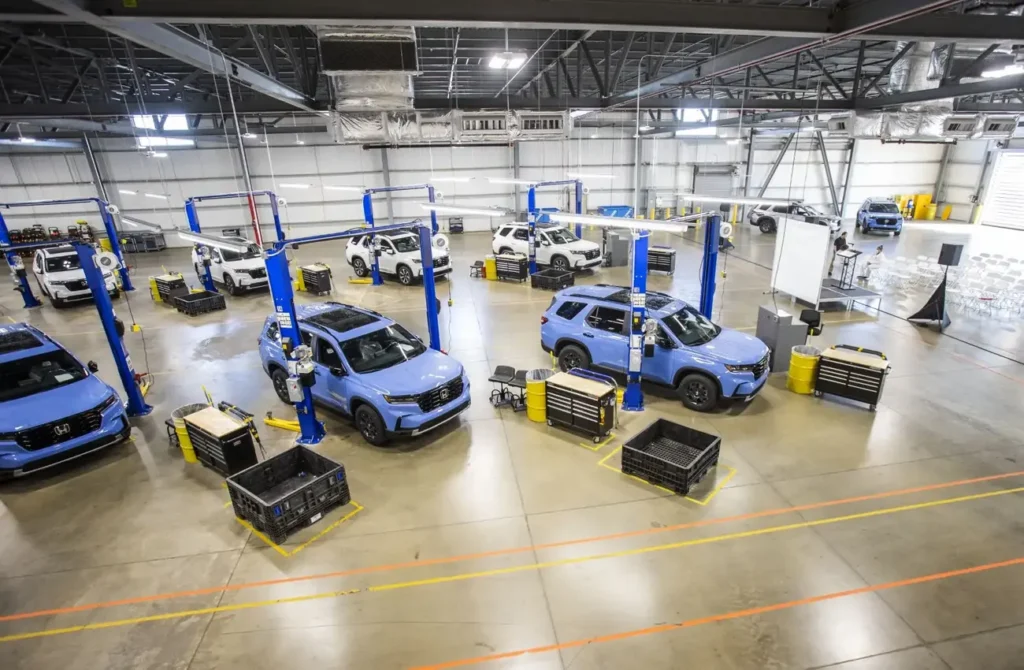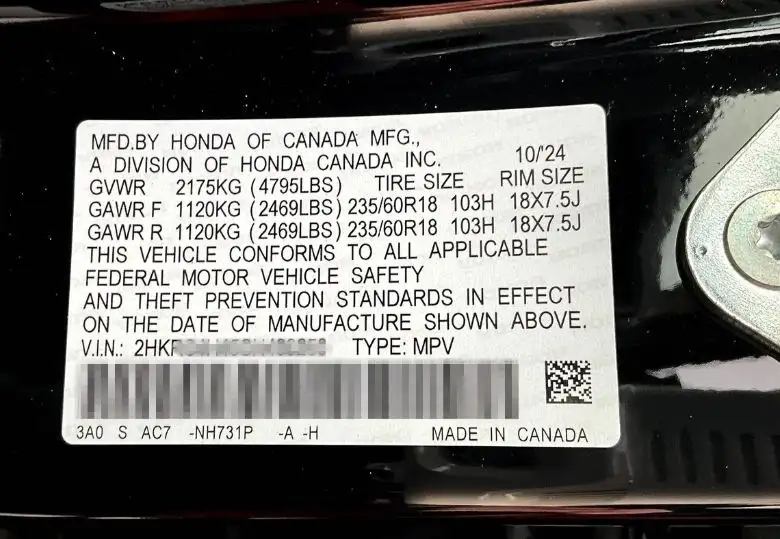Where Is The Honda CR-V Made? (A Detailed Look)
Have you ever wondered where the Honda CR-V is made? Pinpointing the origins of your SUV isn’t always straightforward.
The Honda CR-V is a global favorite, found in nearly every corner of the world, which means it’s manufactured in multiple locations across the globe.
In this article, we’ll explore where the Honda CR-V is built and tackle some common myths about how its manufacturing locations affect its quality.

CR-V Manufacturing Locations
The latest Honda CR-V is manufactured in several locations across North America, including:
- East Liberty, Ohio
- Greensburg, Indiana
- Alliston, Ontario, Canada
However, some older CR-V models sold in North America were manufactured outside the continent. A few were imported from the UK and Japan.
Most recently, Honda announced that production of the CR-V FCEV will begin at the Performance Manufacturing Center (PMC) in Marysville, Ohio. This facility is typically reserved for high-performance models like the Acura NSX.
So, how can you tell where your CR-V was made? We’ll cover that in the next section.
How to Tell Where Your CR-V Was Built
The easiest way to determine where your Honda CR-V was made is by checking the placard on the driver’s side door.

This placard typically includes the VIN (Vehicle Identification Number) and other key details, such as load capacity and tire size. You should be able to find information about the manufacturing location here.
However, some CR-V owners have reported that the placard doesn’t always include the manufacturing location. If that’s the case for your CR-V, you can still find this information by examining the VIN.
The first digit of the VIN indicates the CR-V’s manufacturing location. Here’s a breakdown of what those numbers mean:
- J: Japan
- S: United Kingdom
- L: China
- 1,4,or 5: United States
- 2: Canada
- 3: Mexico
Impacts of CR-V Production Location on Vehicle Quality
Does the CR-V Manufacturing Location Affect Its Quality? The simple answer is: it shouldn’t.
Honda implements the same processes and quality control standards across all its manufacturing plants, ensuring uniformity in production.
That said, some enthusiasts speculate that CR-V models made in Japan are of better quality. The argument is that Japanese workers have a stronger work ethic, greater attention to detail, and access to better spare parts. While I understand this perspective, it remains largely unfounded.
Interestingly, CR-V prices do vary between countries. For example, CR-Vs in Japan are more expensive than those in the US or Canada. However, this price difference likely stems from local economic factors rather than any differences in quality.
While I maintain that CR-Vs made in different locations are of equal quality, there are indeed some distinctions worth noting. Certain third- and fourth-generation CR-Vs sold in the US were imported from the UK and Japan, and these models feature slightly different parts compared to those manufactured in the US.
This difference in parts can pose challenges for owners when it comes to repairs, as sourcing specialized components may be more difficult. For this reason, many CR-V owners prefer models made in the USA, where replacement parts are more readily available.
History of Manufacturing Locations
For decades, the Honda CR-V has been one of the most popular SUVs worldwide. To meet growing market demand, Honda manufactures the CR-V in multiple locations across the globe.
Originally, production of the CR-V began in Sayama, Japan, and Swindon, United Kingdom, to serve the global market. Over time, Honda expanded its manufacturing sites to several other locations to keep up with increasing demand.
- Sayama, Japan
- Swindon, UK
- Wuhan, China
- Guangzhou, China
- East Liberty, Ohio, USA
- Greensburg, Indiana, USA
- Alliston, Ontario, Canada
- El Salto, Jalisco, Mexico
- Ayutthaya, Thailand
- Jakarta, Indonesia
- Johor Baru, Malaysia
- Santa Rosa, Philippines
Throughout its model years, the Honda CR-V has had unique names and features depending on the market.
While it’s always been known as the Honda CR-V in North America, it’s called the Honda Breeze in China.
We typically recognize it as a 5-seater SUV, but in some countries, it’s available in a 7-passenger configuration. Surprisingly, up until a few years ago, brand-new Honda CR-Vs with manual transmissions were still being sold in certain markets.
Despite differences in name, features, and equipment across regions, the Honda CR-V retains the same core design and delivers consistent quality worldwide.
Frequently Asked Questions
Your CR-V, Built for the World
If you’ve ever wondered where your CR-V was made, it’s easy to find out. Simply check the information on the placard located on the driver’s side door.
The Honda CR-V is produced in various locations around the world, which makes sense given its popularity in many countries. While there may be differences in features and even names depending on the market, there is no difference in quality between CR-Vs made in different locations.
So, where was your Honda CR-V made, and how has your experience been with it? Feel free to share in the comments!

I purchased a 2025 Honda CRV EX-L. I already have a steering problem recall on it. Are recalls associated with specific manufacturing locations?
I’m sorry to hear you’re having that problem with your CR-V. Honda did recall most of the 2023-2025 CR-V, but I don’t think it’s associated with the manufacturing location.